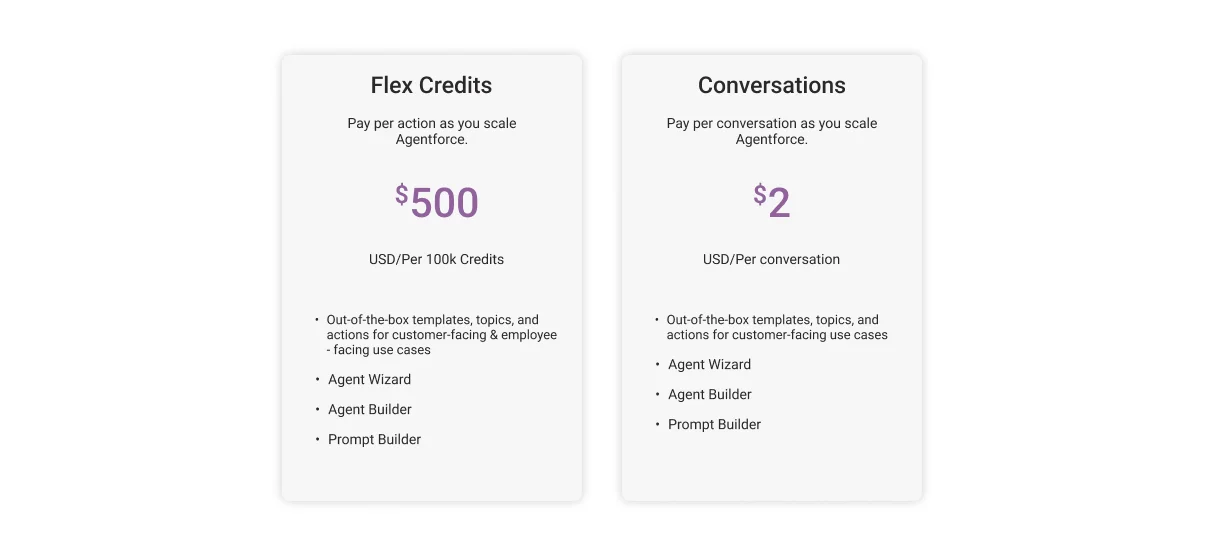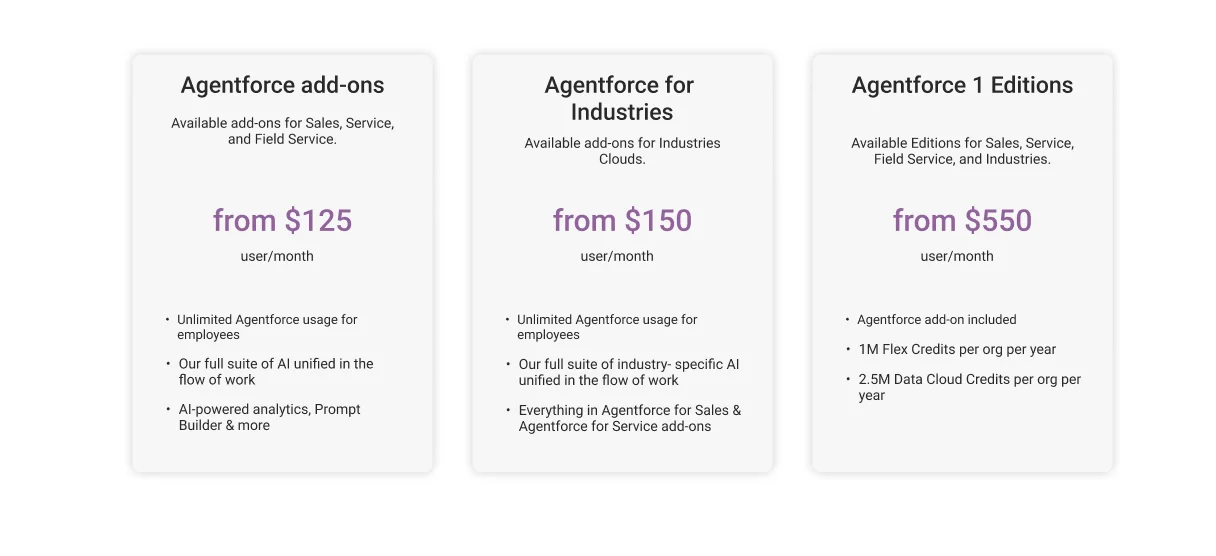Salesforce
ServiceNow
Table of Contents
Imagine boosting your business’s productivity with automated workflows, accelerating case resolution, and analyzing data to take appropriate action without increasing headcounts and burdening your business teams. Salesforce Agentforce makes it possible.
Agentforce is a Salesforce CRM’s autonomous digital labor platform, that helps you create AI agents that work hand-in-hand with your human workforce to automate sales, marketing, customer service, and commerce processes.
These AI agents are not mere chatbots but intelligent, action-oriented entities that learn from your business data, analyze it, and use it to respond to customer needs. But how does Agentforce help you create these agents? This blog will help you explore the core tools it offers, how it works, what it costs, and why it’s becoming a game-changer for businesses looking to scale smarter.
Let’s get started!
Agent Builder is a low-code tool that simplifies configuring and customizing agents. It helps you create agents in two ways: using pre-built agent templates such as SDR agent, sales coach, and service agent, or creating new agents from scratch.
Once your agent is set up, you can define its functionality and tasks it will perform using natural language prompts, set up data access permissions or guardrails, and create a library of actions for agents to use.

Atlas Reasoning Agent or Engine is the core component that powers Agentforce, often described as the ‘brain’ behind AI agents. It enables agents to analyze user queries, collect relevant data, and autonomously create action plans. By leveraging natural language processing, advanced learning, and reasoning AI technologies, Atlas ensures that agents take logical and informed actions in response to the user’s needs.
Guardrails are instructions or rules that define what tasks an AI agent will perform and what it will avoid. These guidelines ensure the agent stays within ethical business boundaries while delivering relevant and appropriate user responses. You can set them up using natural language prompts.
Agent Builder has built-in ‘harm and toxicity detection guardrails’ that identify harmful and inappropriate content and respond accordingly. It also recognizes and blocks attempts at reverse engineering, strictly adhering to defined rules.
Model Builder works with LLMs in Salesforce and allows you to integrate and leverage AI models built on external platforms through APIs and connectors. You can create your own AI models within the platform, using no-code and low-code interfaces and leveraging data from Salesforce Data Cloud.

The Prompt Builder creates reusable prompts for different business workflows. You can leverage pre-built templates that use data from sources like Data Cloud, APIs, and Salesforce flows or create new prompts to activate new functionalities. It enhances your overall work processes while providing relevant and personalized results.

Agentforce Testing Center is a platform that tests, deploys, monitors, and measures AI agents’ working accuracy and performance. It uses synthetic data that mimics real-world data and runs various tests over it to ensure the accuracy and reliability of the agent’s response.



AgentExchange is a marketplace for pre-packaged Agentforce actions, topics, and templates. It allows users to easily discover and enable agent functionalities across various industries such as high-tech, financial services, manufacturing, healthcare and life-sciences, retail, consumer goods, and more.
This platform allows you to find solutions based on your specific business needs and goals, as well as browse and compare solutions that have already worked for other businesses.
It starts with Agent Builder, which allows you to choose among the pre-built AI agent templates, or you can opt to create a new agent from scratch.


These actions are the actual executions or responses that the agent will offer to users.
Note: For pre-built agents, these flows have already been created and auto-launched.


Learn how AI agents help you across your key business workflows.
Agentforce agents can seamlessly integrate with the Salesforce Sales Cloud applications. They help you in:
You can integrate AI agents into Marketing Cloud in Salesforce, which will help you across:
Agentforce Service agents can be effortlessly incorporated into Salesforce Service Cloud features, assisting you with:
Integrate Agentforce agents within your Commerce Cloud environments, whether B2C or B2B. These agents provide valuable assistance in:

SCA, a leading environmental service provider in the USA, leveraged Agentforce to deal with inefficient field operations.
Agentforce streamlined job appointment booking for customers. They simply texted requests like “I need a sweeper for Bourbon Street after the parade,” and agents instantly retrieved data from Service Cloud to provide available time slots and book the job. In case of any changes, a quick follow-up text allowed agents to adjust timing and routes immediately. This reduced hold times and manual coordination.
Its integration with the Salesforce Field Service mobile application allowed drivers to connect with the job’s point person across their preferred communication channel. It navigated job obstacles and streamlined resource re-routing as soon as the driver queried, “There is some construction going on in my route.”
Agentforce used truck telematics, which are sensors that track speed, location, and vehicle performance, in order to detect abnormalities like sudden slowdowns of vehicles that may signal a crash. In such an event, the AI voice assistant promptly asks the driver, “Are you hurt?” and, if there’s no response or the driver confirms an injury, Agentforce automatically alerts first responders or sends a tow truck to the location.
SCA anticipates saving $10 million annually through boosted dispatcher productivity and optimized driver routing. Digital labor now speeds dispatching and provides timely, hands-free assistance, improving both customer satisfaction and driver safety.
SharkNinja is a publicly traded, Massachusetts-based product design and technology company. It is known for its two flagship brands: Shark for floor care and home environment appliances and Ninja for kitchen appliances.
Using Agentforce, SharkNinja was able to expand into new markets without increasing headcounts. As AI agents leveraged knowledge bases to handle a high volume of technical and product care queries while suggesting cross-sell opportunities to drive higher sales.

It uses a consumption-based pricing model, charging $2 per conversation. That means $2 is charged for each interaction between an Agentforce agent and the user, whether customer or employee. Along with this, you get a pre-built service agent, access to Agent Builder, and Prompt Builder.

Agentforce Add-ons
These add-ons start at $125 per user per month.
Benefits they offer:
Agentforce for Industries
Starts at $150 per user per month.
You get:
Agentforce 1 Editions
It starts at $550 per user per month.
You get:
Flex Credits
Understand the scenario here.
Slack Plan Updates
Pricing for Enterprise and Unlimited Editions
An average of 6% has increased list pricing for these editions. (source)
Agentforce is transforming how businesses operate by enabling AI agents to handle tasks across sales, marketing, service, and commerce. These agents work around the clock, improving efficiency and customer satisfaction.
However, to fully leverage Agentforce’s capabilities, a skilled Salesforce developer is essential. At Smart IT Staff, we provide experienced Salesforce developers for hire. They can help you customize AI agents as per your business needs while managing integrations with Salesforce clouds and maintaining their optimal performance.
Agentforce focuses on building autonomous agents that perform entire end-to-end business processes without constant human input. On the other hand, Einstein augments users with AI-driven insights and content that forecasts trends, summarizes cases, and more directly within CRM records and workflows to boost productivity.
No, Agentforce focuses on handling your work processes, while Copilot is a general AI assistant that helps with tasks like writing emails, analyzing data, or answering questions.
Agentforce supports multiple languages, such as English, Spanish, French, German, and Japanese. Exact options depend on Salesforce’s settings and regional support. Most tools let businesses customize language preferences for their teams and customers.
AI agents are intelligent entities that can autonomously perform tasks, make decisions, provide personalized assistance, and interact with both your business employees and customers. They leverage NLP, LLM, and ML models to perform these activities.
Access a team of certified IT professionals.
Let us know the skills you want to augment your organization, and we’ll help you fill the skill gap rapidly.

By submitting the form, you consent to Smart IT Staff processing your information in accordance with the Privacy Policy. Your information is safe with us, and we will use it for the intended purposes only. You can opt out of email updates at any time.